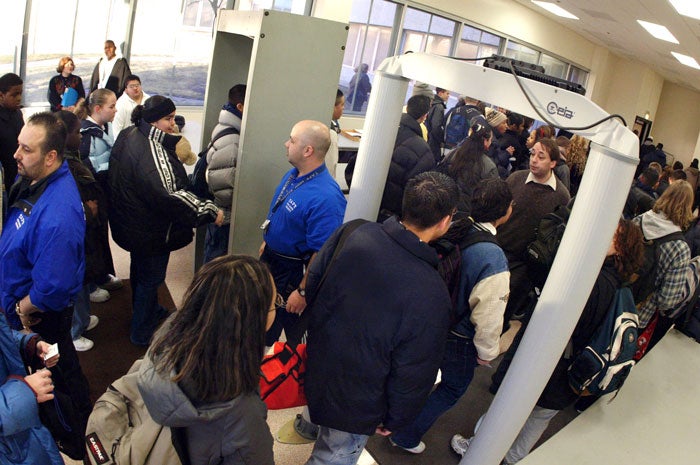Teachers back metal detectors for schools

Airport-style metal detectors could soon be fitted in hundreds of secondary schools in an effort to deter pupils from carrying knives.
Details of the initiative emerged as Jacqui Smith, the Home Secretary, admitted she would feel unsafe walking alone in London at night. Police are investigating a series of stabbings this month and Gordon Brown has expressed his alarm about "out of control" gangs of teenagers on the streets. More than three-quarters of knife crime is committed by 12- to 20-year-olds.
The metal detector plan will be a key element in a new government action plan on violent crime next month.
Although the initiative carries disturbing echoes of some US cities, where high-school pupils are routinely scanned for weapons, head teachers said it could help to tackle violence in high-crime areas.
Ms Smith said schools could "build on" schemes by the British Transport Police to install metal detectors in busy railway stations. "I think it is a good idea if we look at the ways in which, in some schools, it might be appropriate to use search arches," she told BBC1's The Andrew Marr Show. "I want young people to know it doesn't make them safer to carry a knife – it actually makes them more likely to be a victim."
It is understood the use of metal detectors will be encouraged in schools in cities worst affected by knife crime, such as London, Birmingham and Liverpool.
John Dunford, general secretary of the Secondary Heads Association, said: "There are schools serving areas where knife crime is high in the community and it is right these schools take measures to protect pupils."
Chris Huhne, the Liberal Democrats' home affairs spokesman, said: "It is sad school scanners are necessary to stop a small minority of young people from carrying knives. But the number of high-profile stabbings at or outside schools in hot-spot areas for gangs means this is a sensible precaution."
Ms Smith also confirmed the Government was looking at whether alcohol was being sold too cheaply by supermarkets following the murder of Gary Newlove, the Warrington man killed by a group of drunken teenagers.
"I think we need to look at whether or not both pricing and promotion is having an impact," she said.
Asked if she would feel safe walking in a deprived area such as Hackney at midnight, Ms Smith said: "Well, no, but I don't think I'd ever have done. You know, I would never have done that at any point of my life."
She was also asked whether she would feel at risk in a more affluent district such as Chelsea. She replied: "Well, I wouldn't walk around at midnight and I'm fortunate that I don't have to do that."
David Davis, the shadow Home Secretary, said: "This is an astonishing admission. It is shameful you can walk the streets of New York, Tokyo, Paris and Berlin safely at night, but not the streets of London."
Next month's violent crime action plan is expected to set out moves to increase the numbers of searches by police of suspected troublemakers and make more use of CCTV to catch them on tape.
The American experience
Metal detectors are still relatively rare and hugely controversial in US schools, but they have been used, particularly in rougher inner-city neighbourhoods, for at least 20 years with some success.
Reliable statistics are hard to gather, but studies down the years suggest that about 10 per cent of US schools use metal detectors – either the door-frame style commonly found in courts and other sensitive public buildings, or hand-held ones that school officials are able to use at their own discretion.
The proportion is much higher in urban areas – particularly Chicago, which installed detectors in every middle and high school a few years ago.
Some detectors were installed in response to the 1999 Columbine High School shootings and other widely publicised killings. But for the most part schools decide the issue on their own criteria.
A 1992 study in Oklahoma suggested metal detectors had helped cut the number of weapons being brought into schools by more than half, and helped cut violent crimes by about 35 per cent.
Andrew Gumbel
Subscribe to Independent Premium to bookmark this article
Want to bookmark your favourite articles and stories to read or reference later? Start your Independent Premium subscription today.

Join our commenting forum
Join thought-provoking conversations, follow other Independent readers and see their replies